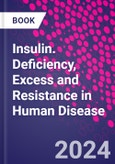Insulin: Deficiency, Excess and Resistance in Human Disease provides an overview of the role of insulin in the pathogenesis of prevalent non-communicable diseases such as obesity, type 2 diabetes, cardiovascular disease, and cancer, along with a comprehensive review of insulin replacement therapies and novel cardioprotective and insulin-sensitizing drugs. Notable advances in precision diagnosis and therapy for single gene subtypes of diabetes in recent years are also discussed.
The discovery of insulin and its lifesaving introduction into clinical practice is one of the most celebrated accomplishments of medical science. However, despite decades of progress and major technical advances, the goal of providing insulin replacement therapy that truly mimics normal physiology remains elusive.
Please Note: This is an On Demand product, delivery may take up to 11 working days after payment has been received.
Table of Contents
Forewordby Steve Edelman
Introduction and Preface
by Andre J Krentz
Section 1: Normal Physiology: Insulin Secretion and Insulin Action
1. Insulin Biosynthesis and Release
by Gabriela da Silva Xavier
2. Classic Metabolic Actions of Insulin in Humans
by Andrew J Krentz
3. Non-classic Effects of Insulin
by George King
Section 2a: Role of Insulin in Human Disease
4. Type 1 Diabetes Pathogenesis: Lessons Learned and Questions that Remain
by Adebola Matthew Giwa, Abdel Hamad, Zahra Omidian, Angela Yang, Neha Majety, Tiffany Jackson, Kusuma Ananth, Mohanraj Sadasivam, Marjan Behzadirad, Thomas Donner and Rizwan Ahmed
5. Insulin Therapy A Century of Progress
by Geremia Bolli
6. Treatment and Prevention of Type 1 Diabetes in the 21st Century
by Jay S Skylar, David Baidal, and J Sosenko
7. Differentiation of Diabetes by Pathophysiology: A Focus on Insulin Deficiency vs Insulin Resistance
by Adrian Heald
Section 2b: Syndromes of Insulin Excess
8. Congenital Hyperinsulinism
by Katherine Lord and Diva D De Leon
9. Hypoglycemic Disorders in Adults
by Adrian Vella and Maheswaran Dhanasekaran
Section 2c: Insulin Resistance in Human Disease
10. Obesity and Insulin Resistance: Pathophysiology and Principles of Therapy
by Rita Basu
11. The Cardiometabolic Syndrome and Vascular Disease: Pivotal Role of Insulin
by Michael D Shapiro, Trevor Caldarera, and Jordan Tannenbaum
12. Insulin, IGF-1, and Cancer: Pathogenic Considerations and Therapeutic Opportunities
by John Vincent Reynolds and Jessie Andrea Elliott
13. Insulin and Neurodegenerative Diseases
by Heather A Ferris
14. Non-pharmacological, Pharmacological, and Surgical Options for Obesity-related Cardiometabolic Disorders: Metabolic and Clinical Impact
by Alexander Dimitri Miras, Mariana Abdel-Malek, and Darmiga Thayabaran
15. Syndromes of Severe Insulin Resistance: Lessons from Nature
by Andrew J Krentz
Authors
Andrew J. Krentz Visiting Professor, Institute of Cardiovascular and Metabolic Research, University of Reading, UK. Andrew Krentz has four decades of clinical and translational research experience in metabolic, endocrine and related cardiovascular disorders.His expertise in the life sciences includes preclinical and early-phase clinical drug development; he has personally contributed translational medical innovations to endocrinology clinical practice. He is actively involved in projects focused on precision diagnostics and therapeutics, digital healthcare, and healthy longevity that bridge the academic-industry spaces.
Beyond his expertise in diabetes and endocrinology, he is accredited as a clinical specialist by the European Society for Hypertension and is a member of the Medical, Scientific & Research Committee of Heart UK. He is President-Elect of the Vascular, Lipid & Metabolism section of the Royal Society of Medicine as well as being a member of the European Group for the Study of Insulin Resistance (EGIR) and the Diabetes & Cardiovascular Study Group of the European Association for the Study of Diabetes (EASD).
He has authored more than 200 scientific publications and founded the journal Cardiovascular Endocrinology & Metabolism and serves as Editor-in-Chief.








